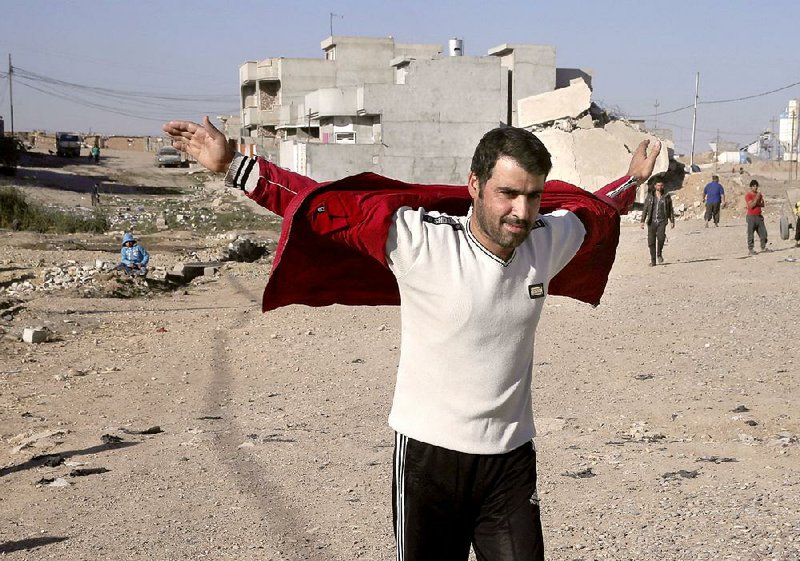MOSUL, Iraq -- Iraqi troops faced stiff resistance Saturday from Islamic State militants as they pushed deeper into eastern Mosul, backed by aerial support from the U.S.-led international coalition, a senior military commander said.
Troops moved into the Muharabeen and Ulama neighborhoods after fully liberating the adjacent Tahrir neighborhood on Friday, said Maj. Gen. Sami al-Aridi of the Iraqi special forces. Al-Aridi said Islamic State militants were fighting back with snipers, rocket-propelled grenades and mortar rounds.
Thick columns of black smoke were seen billowing from the two areas, while dozens of civilians were seen fleeing to government-controlled areas. Shortly before noon, a suicide bomber emerged from a house in the Tahrir neighborhood and attacked security forces, wounding four troops. Later in the afternoon, another suicide car bomber hit the troops in the Aden neighborhood, killing a soldier and wounding three others.
Late on Friday, Islamic State militants attacked the village of Imam Gharbi south of Mosul, controlling most of it for hours before airstrikes were called in, an Iraqi officer said. The clashes and multiple suicide bombings left three policemen dead, including an officer, and four others wounded, he said. Nine Islamic State fighters were killed, he added. The officer spoke on condition of anonymity as he was not authorized to brief journalists.
On Saturday, after the fighting had quieted down, the Kuwaiti government in coordination with a nongovernmental organization distributed 1,000 boxes of humanitarian aid to residents of the Samah and al-Arbajiyeh district in eastern Mosul, which had been cleared of Islamic State militants earlier.
Residents sat on the ground in a long line waiting to receive the aid. As they emerged from their districts, some opened their jackets and raised their hands in the air to show troops they were not wearing explosives. Some waved white flags.
"We don't have any medical support," said Ibrahim Saad, a Mosul resident. "There is no food, no water. I am not talking about electricity, but these three fundamental things are not available."
To the west of Mosul, government-sanctioned Shiite militias took full control of the Tal Afar military airfield Friday night, said Jaafar al-Husseini, a spokesman for the influential Hezbollah Brigades. Al-Husseini said the clashes almost destroyed the airport and that it will be an important starting point for the troops in their advance.
The extremist group captured Mosul, Iraq's second-largest city, in the summer of 2014.
The offensive to retake the city, which began Oct. 17, is the biggest military operation in Iraq since American troops left in 2011. If successful, the retaking of Mosul would be the strongest blow dealt to the Islamic State's self-styled caliphate stretching into Syria. The Shiite militias are leading an assault to drive the Islamic State from Tal Afar, which had a majority Shiite population before it fell to the militants in the summer of 2014, and to cut Islamic State supply lines linking Mosul to Syria.
According to the United Nations, more than 56,000 civilians have been forced from their homes since the operation began out of nearly 1.5 million civilians living in and around Mosul.
In the heavily damaged town of Bashiqa, about 8 miles northeast of Mosul's outskirts, Christians rang the bells of Saint George's church for the first time to celebrate its liberation from the extremist group, which was driven out earlier this month. Much of the town has been reduced to rubble from artillery strikes and air raids.
Parishioners, peshmerga fighters and Kurdish officials sang hymns and played band music as they walked in procession into the church, which was heavily vandalized by Islamic State fighters. Men prepared a large cross to mount on the rooftop, replacing one destroyed by the extremists.
"The first thing they did was break the cross. We want to replace it and tell Daesh that the cross is still here and we are not leaving at all," said the Rev. Afram al-Khoury Benyamen, using the Arabic acronym to refer to the Islamic State.
Bullet holes marked the walls inside the church courtyard, strewn with garbage and graffiti left by the extremists, including some of their names. Much of the inside of the church had been smashed, with rubble strewn across the ground and holy inscriptions covered with black paint. In an upper level, pews had been pushed back to make room for cushions and carpet beneath a broken window that had been used as a sniper's nest, marked out by scattered spent bullet casings.
Broken brass instruments and a torn bagpipe from the church's band lay scattered across the site, with pills and syringes on the floor in one area. The church graveyard was desecrated, with graves broken into and tombstones smashed and painted over.
"It's good they're gone, but how happy can we be? Look at this mess," said 22-year-old Youssef Ragheed, a drummer from the band who had fled the town when the Islamic State controlled it but returned for Saturday's ceremony.
Information for this article was contributed by Mstyslav Chernov and Hussein Malla of The Associated Press.
A Section on 11/20/2016


